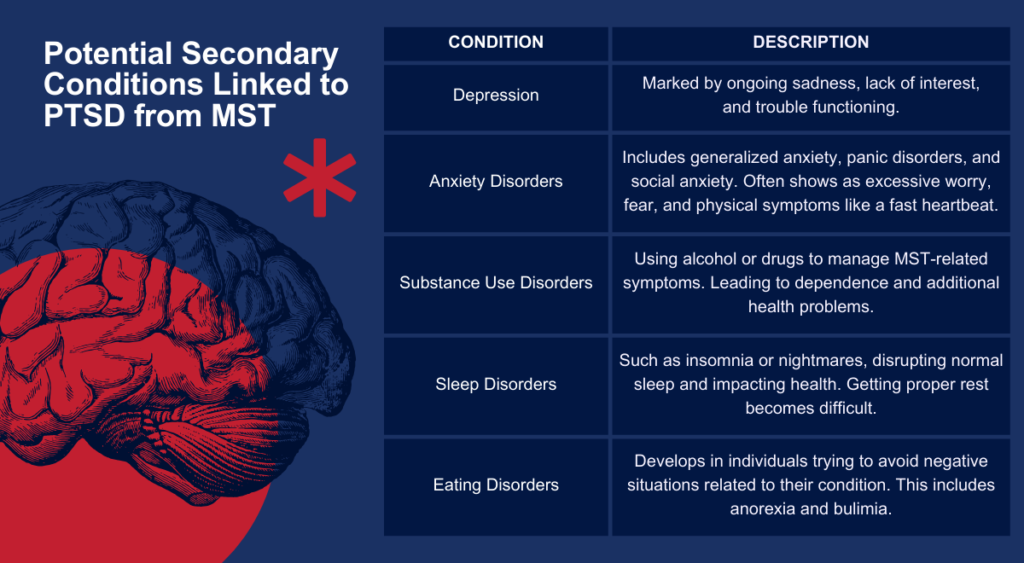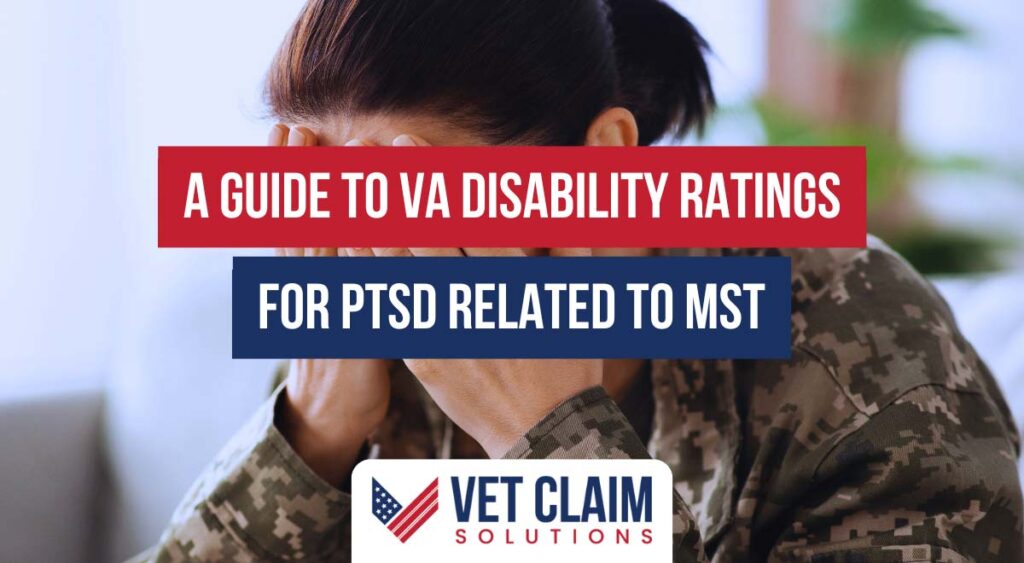Facing the aftermath of Military Sexual Trauma (MST) is a harsh reality for too many veterans. The subsequent process of obtaining a VA Disability Rating for PTSD related to MST can feel incredibly difficult. You are not alone in this journey.
Many others, including myself, have walked this road. We understand the struggles involved in getting a fair VA disability rating for post-traumatic stress.
We will try to make the process as easy as possible for you to understand so you have more knowledge of how the process works. Let’s explore together and empower you.
Understanding Military Sexual Trauma (MST)
Military sexual trauma, as defined by Federal law (38 USC § 1720D), includes experiences of sexual assault or repeated, threatening sexual harassment during military service. This trauma has different forms that impact service members in various ways.
It can happen when someone is forced into sexual activities or experiences unwanted sexual contact. MST can be caused by unwanted physical touching, threats, or inappropriate remarks. Sadly, MST occurs more frequently than reported.
The effects of MST on veterans are profound. The DoD Annual Report for FY 2022 reported 8,942 sexual assaults, slightly more than in 2021. Many cases likely went unreported, making this number just a small piece of the puzzle.
Recognizing PTSD Resulting from MST
MST itself isn’t a diagnosis, but rather an *experience*. Physical and mental trauma effects can stay with a person long after their service. These mental health conditions can lead to disability compensation.
Post-Traumatic Stress Disorder (PTSD) is one of the most frequent. PTSD is a mental health condition that can directly result from MST.
The VA’s Annual Benefits Report consistently shows PTSD as a prevalent issue, impacting veterans’ daily lives significantly. Symptoms like intrusive memories, heightened anxiety, and emotional numbness affect relationships and overall quality of life.
VA Disability Rating for PTSD Related to MST
The VA uses a particular system to assess mental health conditions. A VA disability rating is given for your situation.
The rating for post-traumatic stress disorder resulting from MST adheres to specific standards. The rating depends on how severe, frequent, and long-lasting the symptoms are.
38 CFR § 4.130 offers a detailed guide.

100% VA Rating for PTSD From MST
This rating signifies a severe condition where work is impossible. Consistent support or care is needed.
There’s a clear struggle with things like clear thinking and behavior. This impacts the simplest of daily activities.
Individuals may pose a risk to themselves or others. Symptoms might include severe cognitive impairment and major issues in conduct and perception, seriously limiting daily function.
70% VA Rating for PTSD from MST
This rating indicates that the mental illness significantly impacts social connections and productivity. Home care might be the most suitable option.
Individuals face difficulties in social interactions and professional work. Issues stemming from mental instability require prolonged management or medical help.
Challenges range from constant suicidal thoughts and panic attacks to emotional outbursts and extreme unease. Daily life is substantially affected, both at home and in public.
50% VA Rating for PTSD from MST
Symptoms at this level decrease work efficiency. Individuals experience noticeable difficulty in social interactions.
Symptoms include communication challenges and increased distress. These problems can affect work reliability and complicate meaningful work or social relationships.
Problems include communication, panic attacks more than once a week, and difficulty with basic occupational tasks.
30% VA Rating for PTSD from MST
Here, the condition may occasionally hinder tasks and social life but is controlled with ongoing treatment. Consistent clinical follow-up allows most interactions and duties to stay functional.
This level involves dealing with periods of anxiety, frequent sadness, and consistent struggles. Mild memory loss can increase stress.
Occasional insomnia may occur, but overall, tasks are manageable and normal actions are generally maintained.
10% VA Rating for PTSD from MST
A 10% rating indicates issues that appear mainly during high stress. Medication helps maintain regular functioning.
This rating indicates mild, occasional problems triggered by stressful events. Mental health usually remains stable, allowing professional activities to continue unaffected.
This keeps veterans benefits, social security disability, and other services working properly.
0% VA Rating for PTSD from MST
A formal diagnosis exists, but symptoms don’t require regular treatment. They also do not affect daily activities, social interactions, or work.
This classification indicates identified mental problems that don’t impact daily life. These problems don’t affect activities or work relationships.
A rating this low allows for a well-rounded lifestyle to still occur.

Starting Your VA Disability Claim for MST
Starting a VA disability claim requires several steps. It is vital to be detailed when doing this.
First, complete VA Form 21-526EZ. Then, obtain a formal diagnosis from a healthcare provider.
Remember, MST is not a diagnosis. Mental health conditions like PTSD can result from the experienced trauma.
Building a Strong Case
Gather as much evidence as you can. Proving your condition needs proof of everything involved.
Sometimes, service records might not fully document MST incidents. VA Claims can still go forward. Veterans should use VA Form 21-0781a to submit “buddy statements” and any other documentation.
Include medical records, counseling records, and statements from friends or family to support your filing. Changes in behavior can often indicate that an incident occurred.
A “Nexus Letter” from a medical professional is vital. This letter should detail their diagnosis and confirm that your condition is directly connected to your military service.
Understanding the C&P Exam
The Compensation & Pension (C&P) exam is a necessary step for obtaining disability compensation. Being open during this process, as outlined in 38 CFR 3.159(c)(4), plays a crucial role. The goal is an accurate health review to establish service connection.
During the C&P exam, be honest about all your symptoms. Every shared symptom influences the outcome.
Honesty helps veterans during the application review. It aligns medical findings with criteria and helps in accessing a VA disability compensation.
Potential Secondary Conditions Linked to PTSD from MST
PTSD from MST can lead to other health problems. Documenting these problems proactively can help increase your overall VA disability compensation.
Depression and anxiety often accompany PTSD. Substance use issues may also arise as a way to cope with emotional distress.
Including all these documented problems in your claim can strengthen it.

Evidence and Documentation
Collect all documents, including personal accounts, military medical records, and professional medical opinions. This is to build the strongest possible disability rating case.
Statements from those who know about the events and changes in your life add credibility. A nexus letter confirms the service connection, helping MST survivor claims succeed.
According to VA Form 21-526EZ, proving service-related disabilities requires medical evidence. You also have to have proof of the trauma, establishing the link between the MST experience and your disability.
Seeking Help and Representation
The claim process can be challenging and emotionally triggering. Getting help is more than just a practical step.
Experienced professionals offer support throughout the application process.
They have expertise in creating strong documentation for a VA case review, whether it’s based on medical evidence or service connection. This helps those affected receive the benefits they deserve.
FAQs about VA Disability for MST-Related PTSD
What exactly is considered Military Sexual Trauma (MST)?
MST refers to experiences of sexual assault or repeated, threatening sexual harassment that a veteran experienced during their military service. It’s defined under federal law (38 USC § 1720D).
This can include situations where someone was pressured or forced into sexual acts, experienced unwanted sexual touching, or faced threatening sexual advances or comments. MST is not a diagnosis, but an experience that can lead to various mental health conditions.
These conditions include PTSD. This is unfortunately something a lot of service members deal with.
How does the VA rate PTSD related to MST?
The VA rates PTSD on a scale from 0% to 100%. This scale is detailed in 38 CFR § 4.130.
The rating depends on the severity, frequency, and duration of your symptoms. Factors include your ability to work, your social interactions, and the overall impact on your daily life.
A 0% rating means the condition is diagnosed, but doesn’t impair functioning. A 100% rating indicates total occupational and social impairment.
What kind of evidence do I need for my VA disability claim?
You’ll need various forms of evidence to support your VA claim. This starts with a formal diagnosis of PTSD or another mental health condition from a qualified healthcare provider. It’s crucial to show a clear link between your condition and the MST experienced during service.
You can also provide medical records, counseling records, and personal statements. “Buddy statements” from fellow service members, family, or friends who can attest to changes in your behavior are extremely beneficial.
A “Nexus Letter” from a medical professional, directly connecting your condition to your military service, is invaluable.
What is a C&P exam, and what should I expect?
A Compensation & Pension (C&P) exam is a medical examination conducted by a VA-approved healthcare provider. It helps assess your condition. The purpose is to gather information to determine the service connection and severity of your disability.
During the exam, be honest and thorough about your symptoms and their impact on your life. Don’t downplay or exaggerate anything. The examiner will review your medical records, ask questions about your MST experience and current condition, and may perform a physical or mental health evaluation.
Being honest and complete allows your compensation to get a more appropriate payment that relates to everything going on.
Can PTSD from MST lead to other health problems that the VA might cover?
Yes, PTSD from MST can contribute to several secondary conditions. Common ones include depression, anxiety disorders (such as generalized anxiety, panic disorder, and social anxiety), and substance use disorders.
Sleep disorders like insomnia and nightmares, and even eating disorders, can develop. If these conditions arise due to your MST-related PTSD, they may be considered for additional VA compensation.
It’s crucial to document all health problems and discuss them with your healthcare provider and during your C&P exam.
What if my MST wasn’t officially reported while I was in service?
Many MST incidents go unreported. The VA understands this. You can still file a claim even if there’s no official report in your service records.
You’ll need to provide other forms of evidence. These could include medical or counseling records showing treatment for symptoms related to the trauma, and statements from people who knew about the incident or witnessed changes in your behavior.
VA Form 21-0781a is specifically designed for reporting incidents of personal assault or trauma that weren’t officially documented.
What if I need help with my claim?
Getting help is strongly recommended. The VA claims process can be difficult, especially when dealing with sensitive and traumatic experiences.

Conclusion
Obtaining a VA Disability Rating for PTSD Related to MST requires thoroughness, understanding, and persistence. As someone who’s been through it, I know how challenging this process can feel.
You will go through mental and emotional things while going through this process. You aren’t alone.
With Vet Claim Solutions, veterans gain a partner with firsthand experience. Vet Claim Solutions knows the difficulties involved with getting a proper PTSD rating. Vet Claim Solutions is dedicated to advocating for service members, ensuring they receive the support they have earned with compassion and integrity. We serve locations such as Virginia Beach, Chesapeake, Newport News, Norfolk, and Suffolk.


